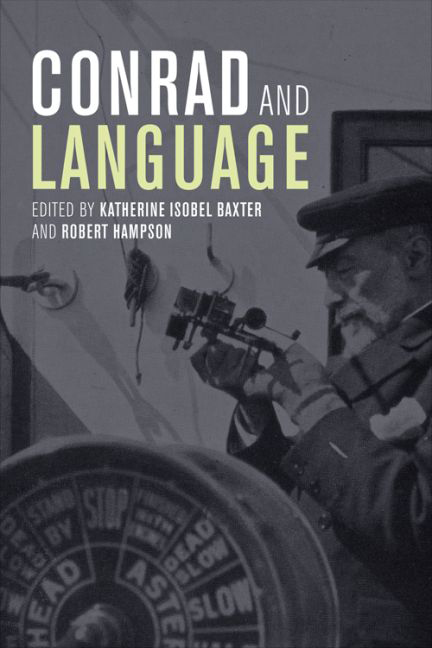Book contents
- Frontmatter
- Contents
- A Note on Texts
- Introduction
- 1 Conrad and Nautical Language: Flying Moors and Crimson Barometers
- 2 Navigating the ‘Terroristic Wilderness’: Conrad's Language of Terror
- 3 Conrad, G. E. Moore and Idealism
- 4 Conrad's Language of Passivity: Unmoving towards Late Modernism
- 5 The Powers of Speech in Conrad's Fiction
- 6 ‘Soundless as Shadows’: Language and Disability in the Political Novels
- 7 Conrad and Romanised Print Form: From Tuan Almayer to ‘Prince Roman’
- 8 Languages in Conrad's Malay Fiction
- 9 Gallicisms: The Secret Agent in Conrad's Prose
- 10 ‘The speech of my secret choice’: Language and Authorial Identity in A Personal Record
- 11 The Russian Redemption of The Secret Agent and Under Western Eyes
- Afterword
- Contributors
- Index
2 - Navigating the ‘Terroristic Wilderness’: Conrad's Language of Terror
Published online by Cambridge University Press: 12 September 2017
- Frontmatter
- Contents
- A Note on Texts
- Introduction
- 1 Conrad and Nautical Language: Flying Moors and Crimson Barometers
- 2 Navigating the ‘Terroristic Wilderness’: Conrad's Language of Terror
- 3 Conrad, G. E. Moore and Idealism
- 4 Conrad's Language of Passivity: Unmoving towards Late Modernism
- 5 The Powers of Speech in Conrad's Fiction
- 6 ‘Soundless as Shadows’: Language and Disability in the Political Novels
- 7 Conrad and Romanised Print Form: From Tuan Almayer to ‘Prince Roman’
- 8 Languages in Conrad's Malay Fiction
- 9 Gallicisms: The Secret Agent in Conrad's Prose
- 10 ‘The speech of my secret choice’: Language and Authorial Identity in A Personal Record
- 11 The Russian Redemption of The Secret Agent and Under Western Eyes
- Afterword
- Contributors
- Index
Summary
Of all the words from the political lexicon in current and frequent use, ‘terrorist’ is one of the most familiar and also one of the most problematic. On one level, the connection between word and concept is straightforward enough: we can recognise an act of terrorism (a hijacking, a suicide bombing, a beheading) as easily as we can recognise any other manifestation of human activity. But if we seek to define the word objectively, to strip away the layers of pejorative meaning that have accumulated around it, we quickly find ourselves in a wilderness of mirrors – or, to use a metaphor favoured by one terrorism expert, in a linguistic ‘Bermuda Triangle’. The scale of the problem becomes clear if we consider that a directory of the various definitions of ‘terrorism’ used by academics, governments and international bodies runs to over 250 entries. The definitional problem has been judged to be of sufficient seriousness to require the attentions of several committees of the United Nations – which, despite starting work on a definition in 1972, have still not achieved an agreed result. A recently proposed ‘academic’ definition, designed to be sufficiently inclusive and exclusive to command expert consensus, contains twelve points and runs to a page of closely written text.
Why is this so difficult? As the UN committees have discovered, agreement is elusive because of the well-worn antithesis of ‘terrorism’ and ‘freedom fighting’: some UN member states insist that national liberation struggles should be omitted from the definition's scope, while others insist that violence by states should be specifically excluded. This shows that the linguistic problem is not simply an academic one. Definitions of ‘terrorism’ are politically contested because so much hangs on them – such as whether a country can be said to be in a state of war, whether violence can be justified pre-emptively or in response to the violence of others, or whether an act of violence is political and therefore should fall outside the boundaries of ordinary criminal law (or indeed whether the criminal law should apply at all).
Information
- Type
- Chapter
- Information
- Conrad and Language , pp. 28 - 43Publisher: Edinburgh University PressPrint publication year: 2016
